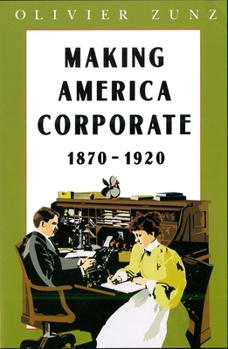Making America Corporate, 1870-1920
Select Format
Select Condition 
Book Overview
In this groundbreaking study, Oliver Zunz examines how the growth of corporations changed
Format:Paperback
Language:English
ISBN:0226994600
ISBN13:9780226994604
Release Date:August 1992
Publisher:University of Chicago Press
Length:278 Pages
Weight:0.95 lbs.
Dimensions:0.7" x 6.0" x 9.2"
Customer Reviews
1 rating
Modern Social Customs & the American Business Enterprise
Published by Thriftbooks.com User , 17 years ago
In economics, students are trained to regard labor markets and the success of products as "market phenonena," set by the entirely impersonal laws of demand and supply. While those ideas have some use in describing the system of exchange and markets for financial instruments, they don't really have much use in explaining the rise of certain patterns in the labor market or the social mores of a workplace. The US economy, in particular, is influenced decisively by the existence of powerful, industrially integrated business entities--the corporation and the trade association. These entities have historically played a crucial role in designing or prioritizing social change. Unlike European capitalist enterprise, which tended to be dominated by cartels of many small organizations, in a mature consumer market, and focused on export to dissimilar cultures, American enterprise was dominated by huge organizations; the goal was the material and social transformation of immense frontier regions with growing populations, through assimilation and co-option. These are sweeping generalizations, and excessively crude, but my object is to point out the peculiar character of America's new (in 1870) corporate system. Olivier Zunz's account attempted to address several of the social changes effected by the rise of the large industrial corporation; his focus is on middle class mores, rather than the now well-documented formation of blue collar labor-management relations. So, for example, he examines the way in which the white collar world of the insurance sector managed the assimilation of large numbers of younger women into its ranks. This, in turn, had a very dramatic impact on social customs related to marriage, courtship, or feminine tastes. Another major theme is the evolution of corporate meritocracy, which of course would establish not only who was successful and who was a failure, but in fact what merit was. Zunz emphasizes the process by which the corporate world courted new cadres of workers, such as young single women from the countryside, who were initially uneasy about this unfamiliar work environment. Impressive architectural monuments, such as the magnificent Met Life building in NYC, were effective at winning recruits, while strict sexual segregation reassured parents of the new workers. Likewise, the extremely powerful sales organizations of the new industrial firms tended to instill religious devotion to the firm and a superficial egalitarianism. Instead of entering into a profession with class boundaries to ultimate life achievement, Corporate America promised unlimited opportunity to rise through the ranks, given sufficient zeal for the firms goals.






